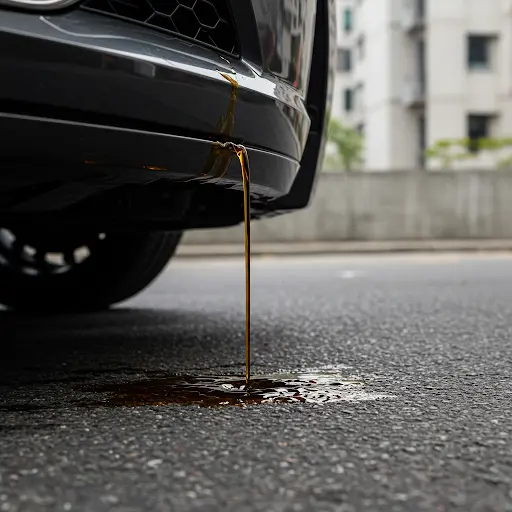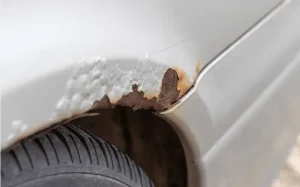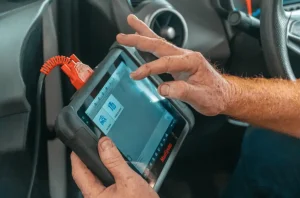Car leaking problems are more common than you might think. One day, you park your car, and the next, you spot a puddle under the car when parked—a sight that can quickly raise questions and concerns. Understanding what’s leaking, how serious it is, and what to do next can help you avoid costly repairs and keep your vehicle in good condition. This guide will walk you through the key information you need when dealing with car leaks, from identifying the fluid to knowing when it’s time to call a mechanic near me.
Should I Be Worried If My Car Is Leaking?
Yes—and no. It depends on what’s leaking. A few drops of water under your car could simply be condensation from the AC system. However, acar leaking fluid from the front driver side might mean a coolant or power steering issue. The color, texture, and smell of the fluid can give you valuable clues. If you’re unsure, it’s always safer to consult a professional.
Car Leaking
A car leaking fluid can indicate anything from minor condensation to major engine or transmission issues. Some leaks might be harmless, such a water from the air conditioner, while others—like brake fluid or transmission fluid—can be dangerous if ignored. Regular vehicle checks and maintenance are key to avoiding unexpected issues and costly car repair.
How to Determine If Your Car’s Leak Is Serious: Signs and Symptoms
Not all Car leakings are equally dangerous, but some can lead to serious damage. Here’s how to determine if your car’s leak requires immediate attention.
- Low fluid levels (check engine oil, brake fluid, etc.)
- Dashboard warning lights
- Overheating engine
- Burning smells
- Poor performance or shifting issues
If you experience any of these, schedule an inspection immediately.
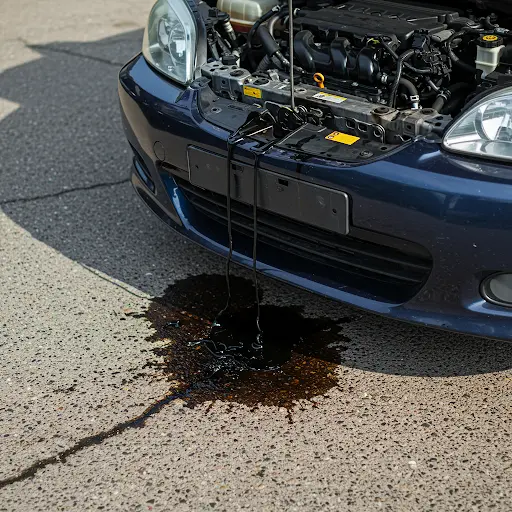
How to Identify Different Types of Car Leaks?
Identifying the source of Car leaking is the first step in addressing the problem. Here’s how to tell what fluid is leaking from your car by its appearance and smell.
You can usually tell by examining the fluid:
Clear and Odorless
Likely Fluid: Water from the air conditioning system
Appearance: Transparent and colorless
Smell: None
What it Means: This is usually harmless and is just condensation from the air conditioning system. It’s typically seen in hot weather and doesn’t indicate a serious problem.
Green, Orange, or Pink and Sweet-Smelling
Likely Fluid: Coolant / Antifreeze
Appearance: Bright green, orange, or pink with a watery consistency
Smell: Sweet
What it Means: This is an important fluid that keeps your engine from overheating. If you notice coolant leaking, it could be due to a damaged radiator, hose, or water pump. You’ll need to address this quickly to avoid engine overheating and severe damage.
Dark Brown or Black and Thick
Likely Fluid: Engine Oil
Appearance: Dark brown or black, with a slick and greasy texture
Smell: Slightly burnt or oily
What it Means: Engine oil leaks are often caused by a worn-out oil gasket, a damaged oil pan, or a loose oil filter. If the leak is significant, it can lead to engine damage, so it’s important to top up the oil and consult a mechanic to fix the source.
Red or Brown and Slick
Likely Fluid: Transmission Fluid
Appearance: Bright red, dark red, or brown with a slick texture
Smell: Slightly sweet or metallic
What it Means: Transmission fluid leaks can be caused by problems with the transmission pan, seals, or gaskets. If ignored, this can lead to transmission failure, which is costly to repair. Immediate attention is required to avoid further damage.
Yellow and Oily
Likely Fluid: Brake Fluid
Appearance: Yellow to light brown, often with an oily sheen
Smell: None or a slightly chemical smell
What it Means: Brake fluid leaks can happen if there’s damage to the brake lines, master cylinder, or brake calipers. This is a critical fluid for safe driving—if you notice a brake fluid leak, do not drive the vehicle. Call a tow truck and have it inspected immediately.
Look under the car and match the location and appearance of the puddle with the possible fluids. Take photos and note any dashboard warning lights—it will help your mechanic diagnose the problem faster.
Why Is My Car Leaking Water When Parked?
If your car is leaking water when parked, especially under the passenger side, it’s likely harmless. This usually happens when the air conditioning system drains excess moisture. However, if the water is tinted or smells sweet, it could be coolant—which is a sign of a more serious issue that needs immediate attention.
Top 5 Fluids That Could Be Leaking from Your Car and How to Fix Them
Identifying the type of fluid of Car leaking from your car is crucial in determining the severity of the issue. Here are the top 5 fluids that could be leaking and how to fix them.
1. Engine Oil Leak
Diagnosis: Brown or black color, greasy texture, usually under the engine
Fix: Check the oil level with the dipstick and top it up if low. A mechanic should inspect and repair the source (often a gasket or oil pan).
2. Coolant / Antifreeze Leak
Diagnosis: Green, pink, orange, or yellow fluid with a sweet smell, usually near the front of the car
Fix: Check the coolant reservoir and refill if low, but don’t ignore the leak. Get it sealed ASAP to avoid engine overheating. car water pump replacement cost varies depending on the make and model but is essential to prevent overheating and severe engine damage
3. Transmission Fluid Leak
Diagnosis: Bright red, dark red, or brown fluid under the center or front of the car
Fix: Go to a repair shop immediately. Leaks often come from gaskets, seals, or the transmission pan and can lead to serious damage if ignored.
4. Brake Fluid Leak
Diagnosis: Light yellow to brown, oily fluid near the wheels
Fix: If brake fluid is leaking, do not drive. Call a tow truck and have a mechanic inspect it. Leaks often come from brake lines or the master cylinder.
5. Power Steering Fluid Leak
Diagnosis: Reddish or pink fluid near the front wheels or under the steering system
Fix: A leak affects steering control. Have it fixed quickly — usually caused by a cracked hose or worn-out seal.
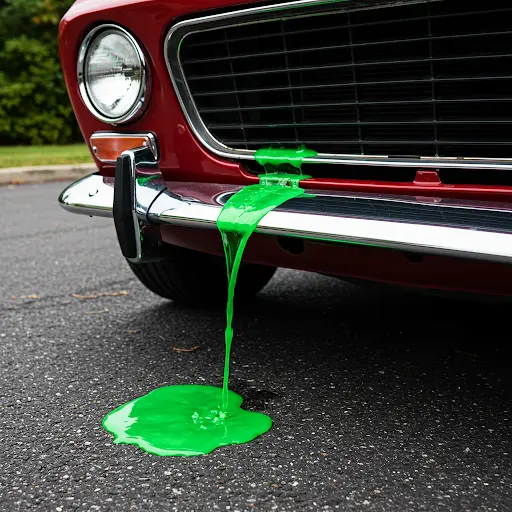
How Weather Affects Car Leaking: Seasonal Considerations
Weather plays a significant role in how and when car leaks occur. In cold weather, rubber seals and gaskets can contract and crack, leading to fluid leaks. Snow and road salt may also accelerate corrosion in metal components. During hot weather, Car leaking at high temperatures can cause fluids to expand and seals to weaken, increasing the risk of leaks in the cooling system, transmission, and engine. Seasonal changes can also hide or exaggerate leaks—what seems like condensation in summer might actually be a slow coolant leak.
Can You Drive with a Leaking Car?
In some cases, yes—but it depends on the type and severity of the leak. A slow windshield washer fluid leak is not a major issue. But driving a with a car leaking transmission fluid or brake fluid can be dangerous. If the car feels different when you steer, brake, or shift, pull over and contact a mechanic near you as soon as possible.
The Cost of Ignoring a Car Leak: Why Timely Repairs Matter
Ignoring even a small car leak might seem harmless at first, but over time, it can lead to serious damage. Here’s how:
Engine overheating due to coolant loss
When coolant leaks from your vehicle, the engine loses its ability to regulate temperature. This can lead to overheating, which may cause severe internal damage if not addressed in time.
Brake failure caused by fluid leaks
Brake fluid is essential for your braking system to function properly. If it starts leaking, you may notice a spongy brake pedal or slower response times—both of which can significantly reduce your control while driving.
Transmission damage from low fluid levels
Transmission fluid keeps the system lubricated and cool. A leak can cause the fluid level to drop, leading to poor shifting, strange noises, and eventually, serious damage to the transmission itself.
Worsening damage that spreads to other components
A minor leak can gradually affect nearby parts. For example, leaking fluids can corrode belts, hoses, or electrical systems, turning a small issue into a major repair job.
Reduced vehicle safety and reliability
Persistent leaks compromise your vehicle’s performance and can lead to unexpected breakdowns. In some cases, they may even cause you to fail a safety inspection or contribute to dangerous situations on the road.
Addressing leaks early can prevent these major expenses and keep your car in top shape.
Maintenance Includes Insuring Your Ride
Fixing Car leaking is part of smart maintenance—but so is making sure you’re covered. If a leak causes damage or prevents you from driving, having insurance that covers towing or repairs can be a lifesaver. Make leak inspections part of your regular maintenance checklist, especially before long trips
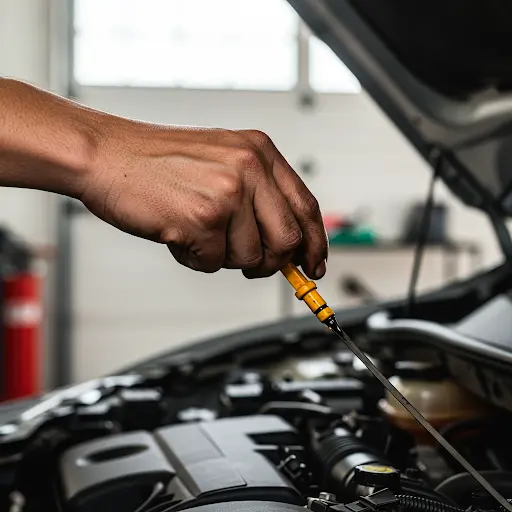
Preventing Car Leaks: Maintenance Tips for a Healthy Vehicle
Proper vehicle maintenance can save you from costly repairs and unnecessary stress. Here are some essential tips to prevent Car leaking and keep your car running smoothly.
- Check Fluid Levels Regularly
Top off engine oil, coolant, and brake fluid as needed.
- Inspect Under the Car Weekly
Look for new spots or stains.
- Replace Worn-Out Seals
Ask your mechanic to inspect seals and hoses during routine service.
- Flush Old Fluids on Schedule
Old fluids can corrode systems, leading to leaks.
- Drive Carefully
Avoid potholes and speed bumps that might damage undercar components.
By preventing fluid leaks in your car, you can avoid worrying about how much to fix exhaust leak or any other unexpected repair costs. Regular maintenance helps you stay ahead of potential issues and saves you from future stress.
When to Seek Professional Help for a Car Leak: Westside Collision Guide
At Westside Collision, we understand how important it is to diagnose and fix leaks fast. Our technicians in Houston, TX, use modern diagnostic tools to accurately identify fluid leaks, no matter how small. Whether it’s a car leaking water underneath passenger side or a more serious car leaking fluid front driver side, we provide reliable, efficient solutions. Book a free inspection with a mechanic near you today to keep your car in top shape.
Conclusion
Dealing with a Car leaking issue may seem overwhelming at first, but with the right information, it’s easy to manage. Whether you see a puddle under car when parked or fluid leaking from specific areas, early detection is the key to avoiding more serious repairs. Keep your car healthy by staying aware and conducting routine maintenance.


